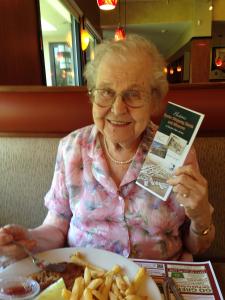Ruth Yentsch Lobach

New Jersey’s Delaware Bayshore
The Bayshore Center at Bivalve’s Oral History program is dedicated to preserving the oral history and culture of New Jersey’s Bayshore region by saving for posterity the oral histories and material culture connected with the Bayshore region, by creating a repository of recordings and data that can be used for research, by preserving, treasuring and celebrating the environment, history and culture of the Bayshore region and by sharing the heritage of the Bayshore region today and with future generations through program related activities serving visitors, students and scholars.
Ruth Yentsch Lobach (b. 1917) spent weekends as a child in Maurice River, New Jersey, in the 1920s and 1930s. Starting at the age of 7, she recalls traveling by car to Maurice River, NJ from Camden, NJ and then in pitch darkness, rowing across the Maurice River to her family's cabin. She describes her days, her family's cabin, her mother's garden, her father and the boys recreational fishing, various people and playing with shuckers' children. Etched in her mind forever is watching the schooners under sail leave during Bay Season. Mrs. Lobach remembers her father hunting and trapping and, of course, could not forget about the mosquitoes after 4:00! As a resident of Camden, she has memories of how wonderful the Delaware River and shad fishing was until it was ruined by pollution in the 1920s.
Please Note: The oral histories in this collection are protected by copyright and have been created for educational, research and personal use as described by the Fair Use Doctrine in the U.S. Copyright law. Please reach out Voices@noaa.gov to let us know how these interviews are being used in your research, project, exhibit, etc. The Voices staff can help provide other useful resources related to your inquiry.
The NOAA mission is to understand and predict changes in climate, weather, oceans, and coasts, to share that knowledge and information with others, and to conserve and manage coastal and marine ecosystems and resources. The Voices Oral History Archives offers public access to a wide range of accounts, including historical materials that are products of their particular times, and may contain offensive language or negative stereotypes.
Voices Oral History Archives does not verify the accuracy of materials submitted to us. The opinions expressed in the interviews are those of the interviewee only. The interviews here have been made available to the public only after the interviewer has confirmed that they have obtained consent.
